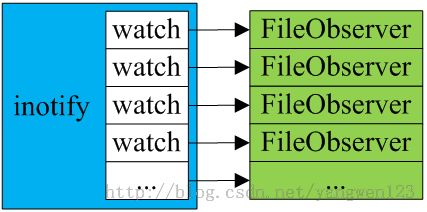Android文件监控FileObserver介绍
在前面的Linux文件系统Inotify机制 中介绍了Linux对文件变更监控过程。Android系统在此基础上封装了一个FileObserver类来方便使用Inotify机制。FileObserver是一个抽象类,需要定义子类实现该类的onEvent抽象方法,当被监控的文件或者目录发生变更事件时,将回调FileObserver的onEvent()函数来处理文件或目录的变更事件。
事件监控过程
在FileObserver类中定义了一个静态内部类ObserverThread,该线程类才是真正实现文件或目录监控过程。各种类型的FileObserver都拥有一个ObserverThread实例:
frameworks\base\core\java\android\os\FileObserver.java
public abstract class FileObserver {
//可监控的事件类型
public static final int ALL_EVENTS = ACCESS | MODIFY | ATTRIB | CLOSE_WRITE
| CLOSE_NOWRITE | OPEN | MOVED_FROM | MOVED_TO | DELETE | CREATE | DELETE_SELF | MOVE_SELF;
//静态创建并启动一个文件监控线程
private static ObserverThread s_observerThread;
static {
s_observerThread = new ObserverThread();
s_observerThread.start();
}
// instance
private String m_path;
private Integer m_descriptor;
private int m_mask;
}
FileObserver类通过静态方式构造了一个ObserverThread对象:
public ObserverThread() {
super("FileObserver");
m_fd = init();//初始化一个inotify实例,Observer线程就是对该inotify实例进行监控
}
frameworks\base\core\jni\android_util_FileObserver.cpp
static jint android_os_fileobserver_init(JNIEnv* env, jobject object)
{
#ifdef HAVE_INOTIFY
return (jint)inotify_init();//初始化一个inotify实例
#else // HAVE_INOTIFY
return -1;
#endif // HAVE_INOTIFY
}
inotify_init()函数实现在Linux文件系统Inotify机制 有详细介绍,然后启动ObserverThread线程,ObserverThread线程运行体:
frameworks\base\core\java\android\os\FileObserve$ObserverThread
public void run() {
observe(m_fd);//监控inotify实例句柄
}
frameworks\base\core\jni\android_util_FileObserver.cpp
static void android_os_fileobserver_observe(JNIEnv* env, jobject object, jint fd)
{
#ifdef HAVE_INOTIFY
char event_buf[512];//定义事件数组
struct inotify_event* event;
while (1)
{
int event_pos = 0;
//从inotify实例句柄中读取事件
int num_bytes = read(fd, event_buf, sizeof(event_buf));
if (num_bytes < (int)sizeof(*event))
{
if (errno == EINTR)
continue;
ALOGE("***** ERROR! android_os_fileobserver_observe() got a short event!");
return;
}
//循环处理读取到的事件
while (num_bytes >= (int)sizeof(*event))
{
int event_size;
event = (struct inotify_event *)(event_buf + event_pos);
jstring path = NULL;
if (event->len > 0)
{
path = env->NewStringUTF(event->name);
}
//调用ObserverThread的onEvent函数通知上层响应
env->CallVoidMethod(object, method_onEvent, event->wd, event->mask, path);
if (env->ExceptionCheck()) {
env->ExceptionDescribe();
env->ExceptionClear();
}
if (path != NULL)
{
env->DeleteLocalRef(path);
}
event_size = sizeof(*event) + event->len;
num_bytes -= event_size;
event_pos += event_size;
}
}
#endif // HAVE_INOTIFY
}
ObserverThread线程循环从inotify实例句柄中读取事件,然后回调ObserverThread的onEvent函数来处理事件。
frameworks\base\core\java\android\os\FileObserve$ObserverThread
public void onEvent(int wfd, int mask, String path) {
// look up our observer, fixing up the map if necessary...
FileObserver observer = null;
synchronized (m_observers) {
//根据wfd句柄从m_observers表中查找出注册的FileObserver对象
WeakReference weak = m_observers.get(wfd);
if (weak != null) { // can happen with lots of events from a dead wfd
observer = (FileObserver) weak.get();
if (observer == null) {
m_observers.remove(wfd);
}
}
}
// ...then call out to the observer without the sync lock held
if (observer != null) {
try {
//调用对应的FileObserver对象的onEvent函数来处理事件
observer.onEvent(mask, path);
} catch (Throwable throwable) {
Log.wtf(LOG_TAG, "Unhandled exception in FileObserver " + observer, throwable);
}
}
}
注册监控watch
FileObserver类提供了startWatching()函数来启动文件监控
frameworks\base\core\java\android\os\FileObserver.java
public void startWatching() {
if (m_descriptor < 0) {
m_descriptor = s_observerThread.startWatching(m_path, m_mask, this);
}
}
由ObserverThread线程对象启动监控
frameworks\base\core\java\android\os\FileObserver$ObserverThread
public int startWatching(String path, int mask, FileObserver observer) {
//在Inotify实例中添加一个watch对象,并得到一个watch对象句柄
int wfd = startWatching(m_fd, path, mask);
Integer i = new Integer(wfd);
if (wfd >= 0) {
//将watch对象句柄和响应该watch事件的FileObserver以键值对的形式保存在m_observers成员变量中
synchronized (m_observers) {
m_observers.put(i, new WeakReference(observer));
}
}
return i;
}
ObserverThread又调用native方法android_os_fileobserver_startWatching()来添加一个watch
frameworks\base\core\jni\android_util_FileObserver.cpp
static jint android_os_fileobserver_startWatching(JNIEnv* env, jobject object, jint fd, jstring pathString, jint mask)
{
int res = -1;
#ifdef HAVE_INOTIFY
if (fd >= 0)
{
const char* path = env->GetStringUTFChars(pathString, NULL);
//在Inotify实例上添加一个watch对象
res = inotify_add_watch(fd, path, mask);
env->ReleaseStringUTFChars(pathString, path);
}
#endif // HAVE_INOTIFY
return res;
}
注销监控watch
FileObserver类提供了使用stopWatching()函数来停止文件监控。
frameworks\base\core\java\android\os\FileObserver$ObserverThread
public void stopWatching() {
if (m_descriptor >= 0) {
s_observerThread.stopWatching(m_descriptor);
m_descriptor = -1;
}
}
frameworks\base\core\java\android\os\FileObserve$ObserverThread
public void stopWatching(int descriptor) {
stopWatching(m_fd, descriptor);
}
frameworks\base\core\jni\android_util_FileObserver.cpp
static void android_os_fileobserver_stopWatching(JNIEnv* env, jobject object, jint fd, jint wfd)
{
#ifdef HAVE_INOTIFY
inotify_rm_watch((int)fd, (uint32_t)wfd);
#endif // HAVE_INOTIFY
}
